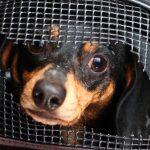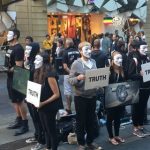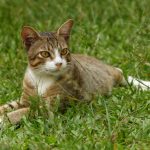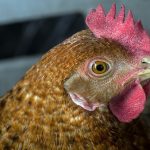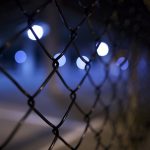Exposing Agricultural Brutality: An Interview with Chris Delforce
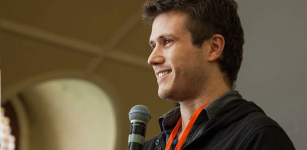
A bill largely aimed at curbing stock theft and illegal hunting in rural NSW passed through state parliament on November 15. NSW Greens MLC David Shoebridge unsuccessfully pushed for an amendment to the bill, due to a provision he described as being aimed at “brave animal activists.”
The Rural Crime Legislation Amendment Bill 2017 amends the Inclosed Lands Act 1901 to expand the offence of aggravated unlawful entry onto inclosed lands, so that it includes situations where an individual entering them “introduces or increases a risk of a biosecurity impact.”
Ag-gag laws
The legislation specifies that the meaning of biosecurity impact is the same as can be found in the Biosecurity Act 2015. This Act, which came into effect in July this year, implemented a framework to manage biosecurity risks that could impact the environment and industry, particularly agriculture.
Section 11 of the Act defines a biosecurity matter “carrier” as “any thing (whether alive, dead or inanimate, and including a human) that has, or is capable of having, any biosecurity matter on it, attached to it or contained in it.”
This broad definition of a carrier can include an activist, film equipment, or even video footage itself. This legislation actually sets up veiled ag-gag laws, which are provisions designed to prevent activists from exposing cases of animal cruelty by filming agricultural practices at farms or slaughterhouses.
And authorities are serious about preventing the exposure of these practices. Under the Act, a category one offence, which can include trespassing and surveillance, carries a maximum penalty of 3 years imprisonment or a $1,100,000 fine.
Revealing the truth
But what’s taking place at legitimate farms and abattoirs that’s leading authorities to impose such extreme penalties aimed at keeping it a secret? Well, Anonymous for the Voiceless have recently been holding protests in Sydney’s Pitt Street Mall to let the public know what they’re hiding.
The silent protesters hold screens playing a clip called Thousand Eyes, which depicts barbaric animal agricultural practices in NSW and Victoria. The filmmaker behind the clip is Chris Delforce, who also made the 2014 documentary Lucent, which exposed the brutal realities of Australian piggeries.
However, doco makers like Delforce can’t go in through the front door, they have to gather their footage in a clandestine manner. And that’s where the biosecurity laws come into play, they provide tough penalties that silence the voices of those who want to reveal the truth.
Australia’s first ag-gag case
Mr Delforce eventually drew the ire of the authorities. In June 2015, a joint NSW and South Australian police taskforce raided his Adelaide home. All his video equipment and footage was seized, and he had to front up in court.
However, Delforce remains defiant. He’s just finishing his new documentary, Dominion. And he’s currently running a crowdfunding campaign, to finance the last shots that need to be taken, as well as the post production costs.
Sydney Criminal Lawyers® spoke with Chris Delforce, executive director at Aussie Farms, about the animal agricultural practices he’s been at the forefront of exposing, the nation’s first ag-gag case, and what he covers in Dominion, his new documentary.
So, Chris, your first major documentary was 2014’s Lucent, which exposed the barbaric side of Australian piggeries.
What sort of practices did the movie uncover?
It covered all sorts of things, like housing. So, farrowing crates, for example, which are in use in well over 90 percent of piggeries in Australia. A mother sow is kept in a small cage for up to six weeks, with her newborn piglets around her at her feet.
And then there’s sow stalls. They’re the same kind of cage, where the sows are kept in there for up to four months of their pregnancy. It looked at things like group housing, which is an alternative to sow stalls, and at some free-range farms.
It also looked at slaughter: the different ways of slaughtering pigs. The most common way is to stun them using carbon dioxide gas chambers, which all the large Australian slaughterhouses use. For over 20 years the industry has been claiming that it’s a humane way to kill them.
They’ve been saying that the pigs just gently fall asleep. The footage that we managed to get showed that every single pig that goes into that chamber screams and thrashes immensely in their last moments.
After the release of Lucent, authorities decided to crackdown on what you were doing. Your Adelaide home was raided in June 2015.
Can you tell us a bit about what that operation involved? And what it was like being raided?
There were two police from NSW, who were spearheading the operation and intending to lay the charges. They travelled interstate to Adelaide, and got assistance from around ten South Australian police officers.
There were about a dozen police, who turned up at my home at about 10 am in the morning. They knocked on the door and said, “We’ve got a search warrant. Let us in.”
I could see on the search warrant that they already knew a lot of the equipment they were after. They knew the camera – the model and serial number – that had allegedly been used to capture a lot of the photographs that were on my website, Aussie Pigs.
They spent a few hours going through my whole home, turning my life upside down, and taking anything that was of interest to them. They took computers, hard drives, camera equipment, and any sort of digital media. All up about 15 to 20,000 dollars’ worth of equipment.
And while they were doing that, they were basically lecturing me about how much of a criminal I was. How I should do things the right way, like go to the RSPCA, or the authorities.
That is something that we had done on numerous occasions, when there were animals who were immensely suffering and needed immediate veterinary assistance. We went to the authorities. And they basically did nothing. They just ignored us.
And ultimately, what we were charged with, a couple of those charges were as a result of us going to the authorities. So, it kind of turned back on us. It was quite a horrible experience being raided.
What sort of charges were laid against you in the end?
Initially, after a few months, they laid 17 charges of break and enter to commit a serious indictable offence. And that charge carries a prison term of up to 14 years.
Those charges were dropped, because the case was given to the Director of Public Prosecutions, and they withdrew the charges. I think because the charges were a bit over the top for what had actually occurred.
The charges were withdrawn, and the case was given back to the police. They were basically told that they should find something new to charge me with.
They then charged me under the NSW Surveillance Devices Act. Six charges for publishing material obtained from a surveillance device. And four charges for using a surveillance device to obtain footage.
So, this matter went before the courts. What was the outcome of your case?
The case was dismissed. All the charges were dismissed, because the police weren’t able to prove that they’d obtained the correct authorisation to lay the charges in the first place.
It went on for about two years. It went to court several times – six or so times. And throughout that whole period, the police had never been able to establish that they’d done the right thing in the first place.
The magistrate seemed pretty upset by how the police had conducted themselves. And he basically had no choice but to dismiss all the charges.
You’ve been working on your new documentary. After the raid and court case, have you altered the way you go about making a film? Have you changed your process to avoid being arrested.
Some of these places, there’s only one way that you can expose them, because they’re not going to let you in. There has to be a lot of covert operations involved in getting this footage. And that’s just the way it is, unfortunately.
To be honest, I expect to be raided again at some point.
And so, your new film, Dominion, is going to be released in Melbourne on March 29 next year. What’s the focus of the new movie?
Where Lucent was focused on pigs, Dominion is focused on all the ways that we exploit, use and abuse animals in Australia.
Mostly, it will be focused on animals used as food. But, it will also cover uses for entertainment, for clothing, and briefly touch upon animals used for scientific purposes, like medical testing.
It will be a much more comprehensive view of the way that our attitude towards animals is reflected in how we treat them.
This idea that we consider ourselves superior to them, and that somehow grants us dominion over them, and grants us the right to use them as we please for our own ends. I’m challenging that long-held perception.
You’re running a crowdfunding campaign to finance the post production costs. You also conducted a crowdfunding campaign to get Lucent off the ground.
How’s the current campaign for Dominion going so far?
Last I checked we were just under 75 percent funded. And it’s been running for about two weeks. So, I’d say it’s been running very well. It’s a two-month campaign, so there’s still plenty of time left.
It seems to be quite a highly anticipated film that animal activists, in particular, have been wanting for a long time. And not just in Australia, but around the world.
As you mentioned, when you were raided, you were charged under the Surveillance Devices Act 2007.
Since that time, the NSW government has stepped things up and brought in the Biosecurity Act 2015, which basically enacted laws to stop people like you going onto farms and exposing these practices.
How do you describe what these laws actually do? And what their overall effect is?
It seems with that Act they’ve taken the trespass law and put it on steroids.
The aim of it is to stop activists. I mean, regardless of what they say about legitimate biosecurity intentions, the aim is clearly to stop activists going onto farms, and that came up in parliament a few times.
In fact, there are laws in place already to prevent people from trespassing. There are laws in place already for everything that activists are doing that farmers are getting upset about.
So, what the Biosecurity Act is about is increasing the penalties for people who want to expose what is happening on these farms.
So, you’re out there exposing these farming practices to the public, who might not be aware that some of them are taking place. But, I presume that’s not as far as you, or others like you, want to take things. You want to bring about more substantial changes.
What sort of changes are you pushing for? And what do you want to see happen?
I don’t believe that we should be breeding and killing animals for our food. I don’t believe that we should be making them do things that are against their best wishes, because we want a five-minute meal, that we can get without using animals.
These industries rely on secrecy. A lot of what they do, if consumers were able to see for themselves what was actually happening, they wouldn’t be consumers anymore. They have the right to see that. And they have the right to make an informed decision about what they spend their money on.
If we get to the stage where it’s all out in the open, and everyone knows what animal agriculture involves, the industry will cease to exist. And in my mind, that’s a great thing.
So ultimately, it’s the exposure that will create the shift that needs to come about in order for these practices to be brought to an end?
Yes. I don’t think we’re waiting on the government to implement better ways of exploiting and abusing these animals. We’re not talking about bigger cages, or slightly better ways of killing them.
We’re talking about changes of attitudes that tell us that we’re able to do these things in the first place.
Chris, thanks very much for taking the time out to have this chat today.
Thank you.


